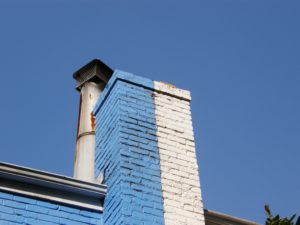
Two primary types of chimneys fight for attention in today’s housing market; prefabricated and masonry. Prefabricated chimneys are generally metal and come in a few different variations to meet homeowners’ varying needs. Masonry chimneys may be brick, block, stone, or any other hard substance held together by mortar. The type of chimney you choose is almost entirely your personal choice. Let’s go over some of the pros and cons, and potentially dangerous issues with each type of chimney.
Masonry Chimneys
I’ll begin with the pros. Masonry chimneys are more visually appealing than prefabricated chimneys. They’re generally made of stone, brick, or block held together with mortar. They’re more durable than a prefabricated metal chimney, stable, and relatively low maintenance.
Now let’s take a look at the cons. Masonry chimneys may crack, chip, or break due to improper maintenance practices. They may develop mold or mildew if water is allowed to remain on them for extended periods of time. They require sealant about once every three years depending on exposure to the elements. Masonry is more labor intensive to install, making it the more expensive choice.
Prefabricated Chimneys
The pros; a prefabricated chimney works best with a prefabricated fireplace. They are less prone to leaking than their masonry counterparts. They’re easy to install. They’re less expensive than a masonry chimney.
The cons; they’ve only been on the market since about 1980. Any damage to the exterior of the unit may cause leaks that are very difficult to trace. Prefabricated chimneys are not as sturdy as a mortar chimney, so even a small chimney fire is capable of causing a great deal of damage.
Maintenance Requirements
Both chimney types require regular maintenance, cleaning, and inspection. Masonry does require more maintenance and upkeep than a metal prefabricated unit, but many homeowners still choose masonry because it simply looks nicer than a plain metal pipe sticking out of the roof.
Masonry may crack or break due to changes in ambient temperature. Homeowners must keep an eye out for cracking and repair it quickly, or the entire chimney may become damaged. Small cracks may be routed out and repaired with a thick mixture of mortar. Make sure to use a sealant immediately after making repairs; after the mortar dries of course.
Prefabricated chimneys don’t crack or chip, but they can leak. Make sure to inspect your prefabricated chimney at least once per year, and hire a chimney sweep to clean and inspect once per year. The best time to inspect and clean is spring, after the last fire and after the potential of nesting birds has passed. Late spring allows the chimney sweep to discover nests and whether small creatures have sought refuge inside your chimney.
Conclusion
All things considered, masonry chimneys are stronger and cause fewer problems for homeowners. The ultimate decision is, of course, the homeowner’s personal choice. Each chimney type must undergo a yearly inspection and cleaning, regardless of type. Call me for a consultation or an appointment to clean and inspect your chimney.
